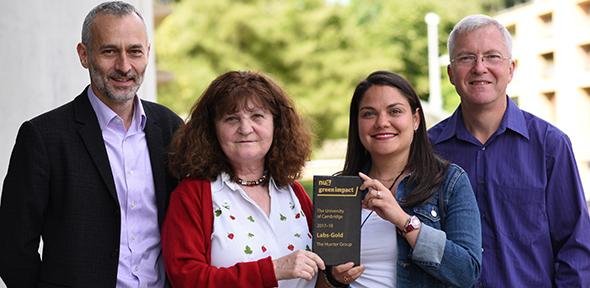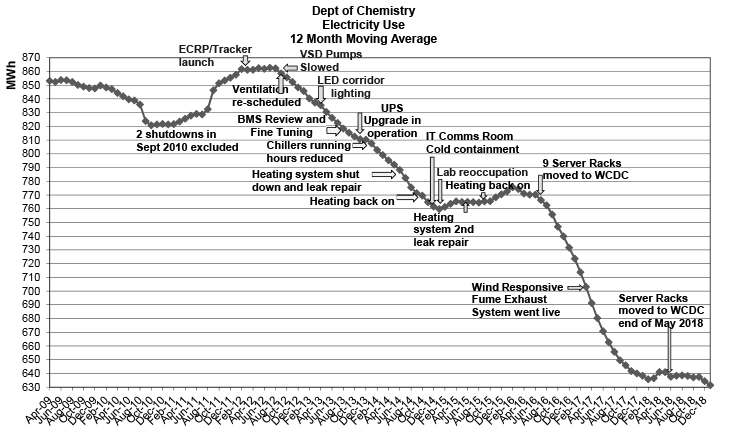
Hunter Group lab manager Giulia Iadevaia and her colleagues Ana Belenguer, Nick Bampos and Richard Turner collecting the Hunter lab's Green Impact 'Gold' award last year.
The department is making real progress in its attempts to become greener and more energy-efficient. In Lensfield Road, we are now using a third less electricity than we did ten years ago: our annual average has fallen from 850 megawatt hours per year to 630 megawatt hours per year. This has been achieved through a combination of big interventions at department and University level, and smaller individual actions.
"It goes to show," says former Head of Department Professor Jeremy Sanders, who led the University's Energy and Carbon Reduction Project from 2011-15, "that when we all work together, we can really make a difference.
"Reducing our carbon footprint long-term is achieved by the university and department investing in energy-efficient infrastructure. But smaller actions, such as individuals turning off lights and computers when leaving a room, also contribute to our efforts. So I'd encourage everyone to think about what they can do personally to save electricity."
In 2010, the University launched its Energy and Carbon Reduction Project, piloting energy and carbon reduction measures across some of the University's most energy intensive buildings (including this one).
Here in the department, the energy-saving drive started with small actions such as turning down the pumps that operate the hot-water heating system, so they were no longer permanently running at full speed. In addition, the hours of operation for the air-conditioning chillers were reduced.
Then more efficient LED lighting was installed in the corridors, the Building Management System (BMS) was fine-tuned, and leaks in the heating system were repaired.
Over time, more significant projects also took place, including moving energy-hungry computer servers out of the building to the West Cambridge Data Centre (which serves the whole of the University). This has contributed to a significant fall in the building's energy consumption (see the graph below) and has brought the additional benefit of freeing-up more space for labs.
Another great step forward was an improvement to the building’s air exhaust system through installing a weather-responsive system. Put simply, this allows the wind (when it's blowing in the right direction) to help draw the air out of fume cupboards, instead of having to run electric fans to extract the air. Installing the system was a significant cost - around £300,000. But the new system is currently saving around £100,000 a year on electricity.
In other energy-saving efforts, replacing 36 drying cabinets in the building with new, more efficient ones is estimated to be saving 19.3 tonnes of carbon dioxide emissions a year (a 55% reduction on what the old units were producing.) And through replacing four ultra-low-temperature freezers with better models, we are estimated to be saving a further five tonnes of carbon dioxide emissions a year.
Scientific research is one of the most energy- and resource-intensive aspects of the University, and this department has historically been one of the largest consumers of energy within the University. So it’s important for us to try and operate our labs and research facilities in more efficient and sustainable ways.

Continuing our energy-reduction efforts, this year the Department is participating in a pilot year of the University's Electricity Devolution Programme.
"The idea is that budgets and responsibility for electricity use will be given to departments," explains University Carbon and Energy Manager Sally Pidgeon. "Each department is set an electricity consumption baseline, based on their historic consumption over the past three years. If a department uses less electricity than their baseline in a given year, they keep hold of the savings and can then use these as they see fit.
"If they use more electricity, they will need to find the additional funding required to pay for it, or make the case for their baseline to be increased. No financial transactions are taking place during the pilot year, but the Department will feel the financial benefit of these initiatives once the scheme goes live from 2020-21."
She adds: "We welcome suggestions from staff and students on how the department can further reduce its electricity use: if they have any ideas on potential projects, they can contact us on EMEnvironment@admin.cam.ac.uk There is also further information on the Electricity Devolution Programme on our website."
Martin Howes, the University's Sustainable Labs Coordinator, is also currently working with staff members here on projects relating to teaching labs, ovens and water saving. He was delighted to see The Hunter Group last year achieve a Green Impact Gold Award at the first time of trying. (See the picture at the top of page of the group receiving their award.) Martin says: "I'd encourage other labs to get in touch with me about getting their labs accredited by this scheme."
And he adds: "If anyone has ideas on energy reduction in their labs, or is looking at efficient equipment alternatives they may be struggling to finance themselves, do please get in touch with me, via EMEnvironment@admin.cam.ac.uk ."
